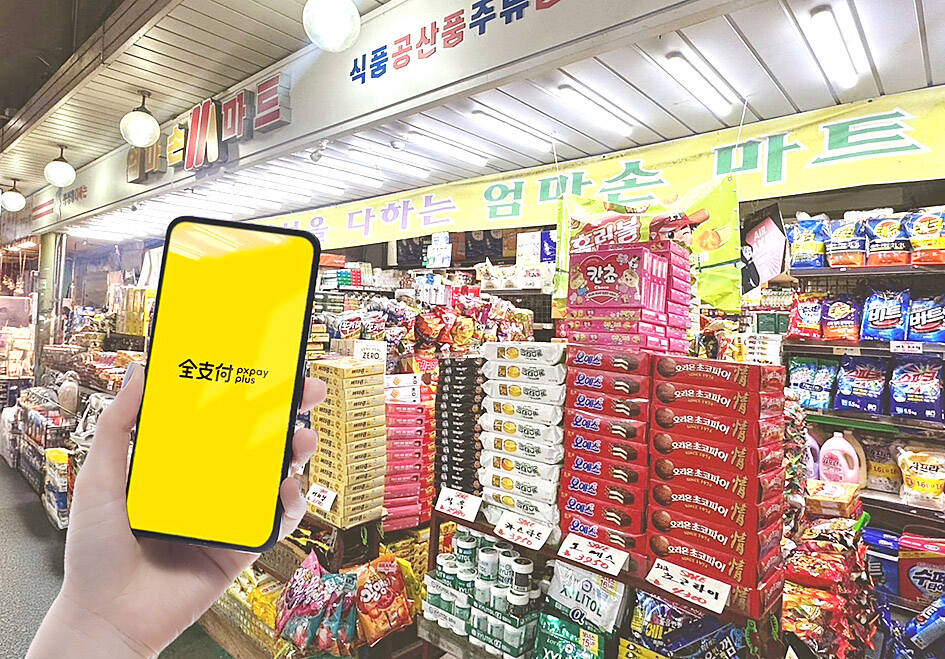PXPay Plus Co Ltd (全支付), wholly owned by the Taiwanese supermarket chain PX Mart Co (全聯), introduced its online payment app, “PXPay Plus,” in South Korea yesterday, becoming the first Taiwanese operator to launch a cross-border payment app in the market.
PXPay Plus, which launched the online payment app in Japan in January last year, made the announcement earlier yesterday.
Citing statistics compiled by the Tourism Administration, the company said that since the summer of 2022, the number of Taiwanese traveling to South Korea had risen from about 90,000 per month before the COVID-19 pandemic to 129,325 in October last year.

Photo courtesy of PXPay Plus Co Ltd
Also, the South Korean government announced recently that it will extend the temporary exemption period for Taiwanese tourists in connection with the Korean Electronic Travel Authorization (K-ETA) until Dec. 31 this year.
This means Taiwanese traveling to South Korea only need to fill in an arrival card to enter the country, increasing their willingness to visit and potentially driving a surge in the use of the online payments in the country, PXPay Plus said in a statement.
The company is the first Taiwanese electronic payment operator to launch an app in South Korea. Through cooperation with Taiwan’s cross-border payment platform HIVEX as well as South Korean electronic payment platform ZeroPay and financial technology company ICB Co, the cross-border payment service is available at more than 1.9 million payment locations, PXPay Plus said.

Taiwan Semiconductor Manufacturing Co (TSMC, 台積電) yesterday said that its investment plan in Arizona is going according to schedule, following a local media report claiming that the company is planning to break ground on its third wafer fab in the US in June. In a statement, TSMC said it does not comment on market speculation, but that its investments in Arizona are proceeding well. TSMC is investing more than US$65 billion in Arizona to build three advanced wafer fabs. The first one has started production using the 4-nanometer (nm) process, while the second one would start mass production using the

When an apartment comes up for rent in Germany’s big cities, hundreds of prospective tenants often queue down the street to view it, but the acute shortage of affordable housing is getting scant attention ahead of today’s snap general election. “Housing is one of the main problems for people, but nobody talks about it, nobody takes it seriously,” said Andreas Ibel, president of Build Europe, an association representing housing developers. Migration and the sluggish economy top the list of voters’ concerns, but analysts say housing policy fails to break through as returns on investment take time to register, making the

‘SILVER LINING’: Although the news caused TSMC to fall on the local market, an analyst said that as tariffs are not set to go into effect until April, there is still time for negotiations US President Donald Trump on Tuesday said that he would likely impose tariffs on semiconductor, automobile and pharmaceutical imports of about 25 percent, with an announcement coming as soon as April 2 in a move that would represent a dramatic widening of the US leader’s trade war. “I probably will tell you that on April 2, but it’ll be in the neighborhood of 25 percent,” Trump told reporters at his Mar-a-Lago club when asked about his plan for auto tariffs. Asked about similar levies on pharmaceutical drugs and semiconductors, the president said that “it’ll be 25 percent and higher, and it’ll

CHIP BOOM: Revenue for the semiconductor industry is set to reach US$1 trillion by 2032, opening up opportunities for the chip pacakging and testing company, it said ASE Technology Holding Co (日月光投控), the world’s largest provider of outsourced semiconductor assembly and test (OSAT) services, yesterday launched a new advanced manufacturing facility in Penang, Malaysia, aiming to meet growing demand for emerging technologies such as generative artificial intelligence (AI) applications. The US$300 million facility is a critical step in expanding ASE’s global footprint, offering an alternative for customers from the US, Europe, Japan, South Korea and China to assemble and test chips outside of Taiwan amid efforts to diversify supply chains. The plant, the company’s fifth in Malaysia, is part of a strategic expansion plan that would more than triple